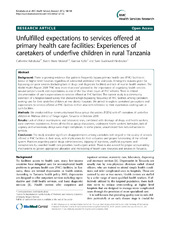| dc.contributor.author | Kahabuka, Catherine | en_US |
| dc.contributor.author | Moland, Karen Marie | en_US |
| dc.contributor.author | Kvåle, Gunnar | en_US |
| dc.contributor.author | Hinderaker, Sven Gudmund | en_US |
| dc.date.accessioned | 2013-05-30T10:51:41Z | |
| dc.date.available | 2013-05-30T10:51:41Z | |
| dc.date.issued | 2012-06-14 | eng |
| dc.Published | BMC Health Services Research 2012, 12:158 | eng |
| dc.identifier.issn | 1472-6963 | |
| dc.identifier.uri | https://hdl.handle.net/1956/6676 | |
| dc.description.abstract | Background: There is growing evidence that patients frequently bypass primary health care (PHC) facilities in favour of higher level hospitals regardless of substantial additional time and costs. Among the reasons given for bypassing are poor services (including lack of drugs and diagnostic facilities) and lack of trust in health workers. The World Health Report 2008 “PHC now more than ever” pointed to the importance of organizing health services around people’s needs and expectations as one of the four main issues of PHC reforms. There is limited documentation of user’s expectations to services offered at PHC facilities. The current study is a community extension of a hospital-based survey that showed a high bypassing frequency of PHC facilities among caretakers seeking care for their underfive children at two district hospitals. We aimed to explore caretakers’ perceptions and expectations to services offered at PHC facilities in their area with reference to their experiences seeking care at such facilities. Methods: We conducted four community-based focus group discussions (FGD’s) with 47 caretakers of underfive children in Muheza district of Tanga region, Tanzania in October 2009. Results: Lack of clinical examinations and laboratory tests, combined with shortage of drugs and health workers, were common experiences. Across all the focus group discussions, unpleasant health workers’ behaviors, lack of urgency and unnecessary delays were major complaints. In some places, unauthorized fees reduced access to services. Conclusion: The study revealed significant disappointments among caretakers with regard to the quality of services offered at PHC facilities in their areas, with implications for their utilization and proper functioning of the referral system. Practices regarding partial drugs administrations, skipping of injections, unofficial payments and consultations by unskilled health care providers need urgent action. There is also a need for proper accountability mechanisms to govern appropriate allocation and monitoring of health care resources and services in Tanzania. | en_US |
| dc.language.iso | eng | eng |
| dc.publisher | BioMed Central | eng |
| dc.relation.ispartof | <a href="http://hdl.handle.net/1956/6697" target="blank">Care seeking and management of common childhood illnesses in Tanzania</a> | eng |
| dc.rights | Attribution CC BY | eng |
| dc.rights.uri | http://creativecommons.org/licenses/by/2.0/ | eng |
| dc.title | Unfulfilled expectations to services offered at primary health care facilities: Experiences of caretakers of underfive children in rural Tanzania | en_US |
| dc.type | Peer reviewed | |
| dc.type | Journal article | |
| dc.description.version | publishedVersion | en_US |
| dc.rights.holder | Copyright 2012 Kahabuka et al.; licensee BioMed Central Ltd. | |
| dc.identifier.doi | https://doi.org/10.1186/1472-6963-12-158 | |
| dc.identifier.cristin | 949495 | |
| dc.source.journal | BMC Health Services Research | |
| dc.source.40 | 12 | |

